Religion-secularism row strains globalization

Illustration: Peter C. Espina/GT
In spite of globalization being a secularizing process, the revival of religion during our times has become a common phenomenon. The heart going back to God reflects a resistance to globalization and a resilience that stems from being marginalized in the process.
The return of religion has been playing the main role of resistance to modernization. Leaders of secular countries have begun to use aggressive language with strong religious undertones to win over supporters. Various forms of religious extremism have evolved into wedges dividing society, providing fertile soil for the emergence of extremist ideology.
Scott M. Thomas said in his book The Global Resurgence of Religion and the Transformation of International Relations: "When religion is politicized or de-privatized as a type of political theology or political religion, it inherently causes war, tolerance, devastation, political upheaval and may be even the collapse of the international order."
In Western societies, the trouble is that the faith of the believers is taken as a kind of freedom that must be guaranteed, even if the form of preaching is sometimes extreme, de-modernizing and may lead to more extremism fomenting social chaos. Despite the threats, society must still endure this freedom of belief.
Why can't secularists persuade believers to return to the modern world? This is almost a taboo in Western civilization.
People are well aware that the spread of Western civilization is not only a process of religious expansion but also one of secularization.
If there is no expansion of capitalism - the strongest secular advocate - no separation of church and state, Western civilization is not sustainable.
The world's major religions have a long history of spreading to China. For the past 500 years, China has been "invaded" by one missionary group or another, but it remains one of the most secularized countries.
The Chinese civilization has lasted for thousands of years while not being comprehensively influenced by one particular religion. As the country achieved the greatest industrialization in history, it did not see any large-scale religious conflict.
It is a miracle in world civilization and needs to be realized by anyone who wants to understand today's China.
All the major religions have doctrines to encourage people to do good things. But given their exclusivity, contradictions and conflicts emerged from time to time both among different religions and between the religious and secular worlds. Sects within some religions also clashed among themselves.
The management of religious communities is necessary for the normal functioning of a secular society. If a nation wants to achieve modernization, the separation of religion and politics is a must. A country must also prevent religions from being radicalized.
This is basic to the governance of a state and has been used flexibly by Western countries. Whenever a nation is found lacking such management, problems ranging from street protests to terror attacks will emerge.
Such big and small issues have become everyday phenomenon in the Western countries and they can only be solved through up-to-date governance measures. It is not some sort of democratic feat worth bragging about and should never be used by one religion as an excuse against another.
Religious followers are allowed to propagate religion through legal means. Secular people also have the right to promote secularism through legitimate ways. This is a challenge faced by Western civilization and globalization.
The author is a senior editor at People's Daily and a senior fellow at the Chongyang Institute for Financial Studies at Renmin University of China. dinggang@globaltimes.com.cn Follow him on Twitter @dinggangchina

